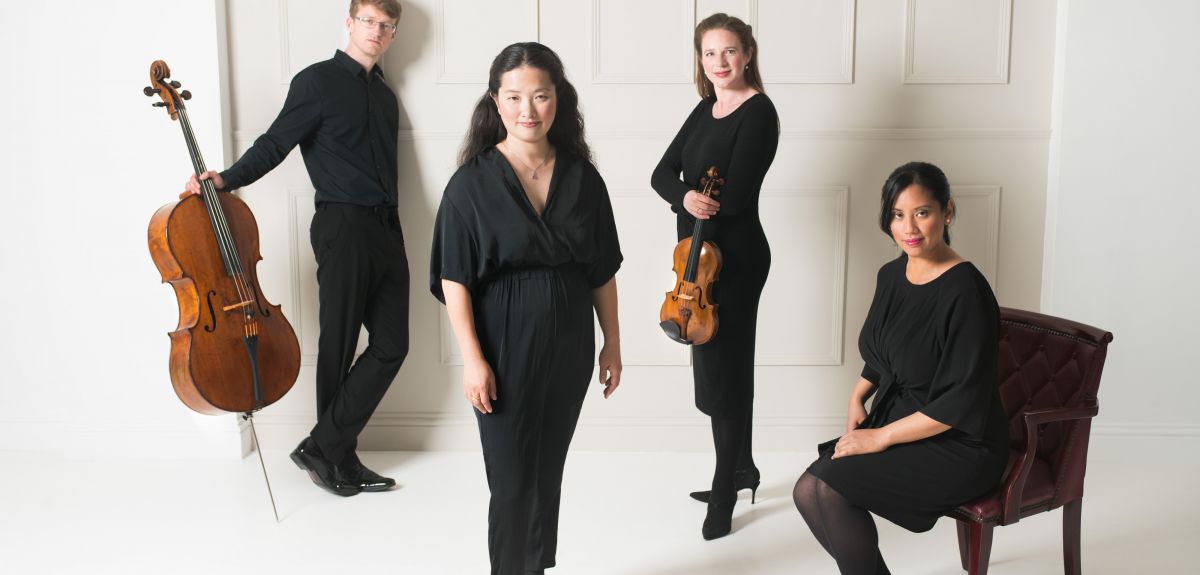
Diversity and the British String Quartet: An Oxford collaboration.
International concern over issues around representation has thrown a light on the classical music world and inspired ‘Diversity and the British String Quartet’, a wide-ranging collaborative project as part of Oxford’s TORCH Humanities Cultural Programme. Although focusing on the string quartet, it explores larger debates around inclusivity, access and identity within the classical music scene.
While the string quartet has associations of high art and intellectualism, it has been a medium for diverse and different British composers
While the string quartet has associations of high art and intellectualism, it has been a medium for diverse and different British composers. It also continues to inspire students, composers, and performers.
The project aimed to work with the widest possible range of those interested in the string quartet and music education, and to combine research with practical work and performance.
Diversity and the British String Quartet has been a collaboration between British music and music education specialists at the Oxford Faculty Of Music, the Villiers Quartet, contemporary composers, and schools.
Young people aged 14-18 at schools around the country have been involved, composing their own string quartets and working virtually over the last six months with professional performers, academics, and composers. On top of this work, the project has simultaneously evaluated the impact of the project on young people in terms of changing their perceptions of and relationship with classical music.
And the Villiers Quartet has commissioned five contemporary British composers to write ‘From Home’ quartets, exploring the experience of writing music in Britain in the current historical moment.
If classical music education is narrowed and defunded to the point of becoming an experience for those who can afford it, is inclusivity narrowed still further? Whose music is this, and what are the views of all those who have a stake in it?
Dr Joanna Bullivant
Dr Joanna Bullivant leads the project, which is supported by the TORCH programme. She believes the questions posed by the collaboration reach into the roots of our society. She says, ‘Increasing focus on STEM subjects in schools and universities, the global pandemic, and the Black Lives Matter protests have all raised important questions about the value of classical music performance and education in Britain.
‘If classical music education is narrowed and defunded to the point of becoming an experience for those who can afford it, is inclusivity narrowed still further? Whose music is this, and what are the views of all those who have a stake in it?’
Second year undergraduate and student mentor Chloe Green says, ‘The project facilitated important conversations and collaborations between diverse musicians in their processes of challenging preconceived notions about, and defining their own relationships to, the British string quartet tradition. It was a privilege to mentor the students as they developed their understandings of this tradition’s history and articulated their inspiring visions for its future.’
Graduate researcher and workshop participant Aaliyah Booker says, ‘I have learned a lot about composition and what it takes to write music for this type of ensemble. It has been fun doing research on the project and equally rewarding to be given an opportunity to play for the Villiers Quartet.’
For the Villiers Quartet, who guided the workshops with young people and commissioned the new quartets, this was a positive amongst the devastating and disruptive pause in performance caused by the pandemic.
Carmen Flores, violist, says, ‘We looked at string quartet composition from all angles - working with students, commissioning new works from our commissioned composers, and exploring repertoire of historical composers who were largely excluded from the mainstream story of British music.’
The live-streamed symposium (Monday 14 – Wednesday 16 June) is the culmination and public presentation of these activities through a series of talks, workshops, and performances.
Classical music has the potential to transform and enrich everyone’s lives, and we are committed to ensuring that those benefits are available to all. It promises to be a thrilling creative project
Professor Daniel Grimley
The symposium’s daily concerts will feature an array of rarely-heard British quartets, plus the world premiere performances of works by composers Florence Anna Maunders, Philip Herbert, Rob Fokkens, Alex Ho, and Jasmin Kent Rodgman. The student quartets, created during the project, will also be performed. Finally, expert speakers from the music industry and academia will address a range of issues in the history of the British string quartet and contemporary practice.
Dr Bullivant says, ‘This ambitious project has been a distinct learning curve for all of us, but hugely rewarding as we have been able to hear from so many different participants and voices on a subject that they are passionate about.’
And Dr Bullivant’s words are echoed by Professor Daniel Grimley, Deputy Head of Humanities, ‘Classical music has the potential to transform and enrich everyone’s lives, and we are committed to ensuring that those benefits are available to all. It promises to be a thrilling creative project.’
Diversity and the British String Quartet | TORCH | The Oxford Research Centre in the Humanities
Schools involved are: St Gregory the Great Catholic School, Oxford; St Marylebone School, London; Graveney School, London; Framingham Earl High School, Norfolk and Trinity Catholic School, Nottingham